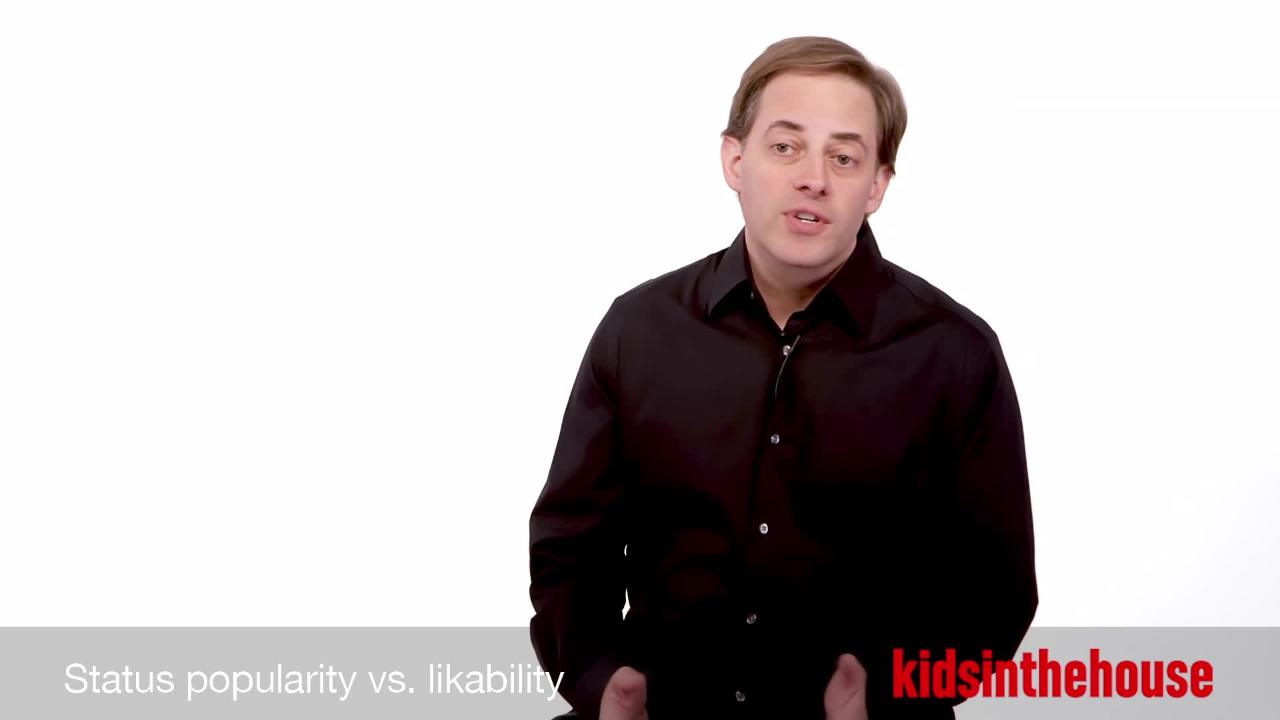Status popularity vs likability
- You know, a lot of people want to know whether they should make their kids more popular or not, but I would say it really depends which kind of popularity you're talking about. Those kids who have high status, in other words, they're the most visible cool kids that everyone wants to be like. They don't do so well. There's been really interesting research, such as research by Joe Allen at University of Virginia that shows that those kids with status popularity grow up at greater risk for anxiety, depression, they're more likely to suffer from addictions, and they have difficulties in their relationships. Now that's all really different than another kind of popularity, which is how likable we are. Now being likable is a great thing for our future life. Kids who are more likable tend to do better at work, they're more likely to be hired and promoted. They tend to do better in their marriages, and even as parents, they have kids who end up growing up to be better adjusted and they also tend to be happier and healthier. Likable people live longer than people who are disliked.
Psychologist Mitch Prinstein says kids with status popularity grow up at greater risk for anxiety, depression, they're more likely to suffer from addictions. Likable kids tend to do much better later in life.
Related Videos
Transcript
Expert Bio
More from Expert
Mitch Prinstein, Ph.DProfessor of Psychology and Neuroscience
Mitch Prinstein, Ph.D. is a husband, a father, board certified in clinical child and adolescent psychology, and serves as the John Van Seters Distinguished Professor of Psychology and Neuroscience, and the Director of Clinical Psychology at the University of North Carolina at Chapel Hill.Mitch’s Peer Relations Lab has been conducting research on popularity and peer relations for almost 20 years, and has been funded by the National Institute of Mental Health, the National Institute of Child and Human Development, and several private foundations, resulting in over 100 scientific works, including a slew of scientific journal articles, book chapters, a set of encyclopedias on adolescent development, and even a textbook on the field of clinical psychology.Mitch is deeply committed to science and training in clinical psychology, having served as President of the Society for a Science of Clinical Psychology and the Society of Clinical Child and Adolescent Psychology, the Editor-in-Chief of the Journal of Clinical Child and Adolescent Psychology, and on the boards of the American Psychological Association, the Council of University Directors of Clinical Psychology, and publication board of the Association of Behavioral and Cognitive Therapies.He and his research have been featured in The New York Times, The Wall Street Journal, National Public Radio, the Los Angeles Times, CNN, U.S. News & World Report, Time magazine, New York magazine, Newsweek, Reuters, Family Circle, Real Simple, and elsewhere.




 GET ACCESS TO ALL PREMIUM CONTENT WITH NO ADS FOR $4.99/MONTH
GET ACCESS TO ALL PREMIUM CONTENT WITH NO ADS FOR $4.99/MONTH
Login or Register to view and post comments